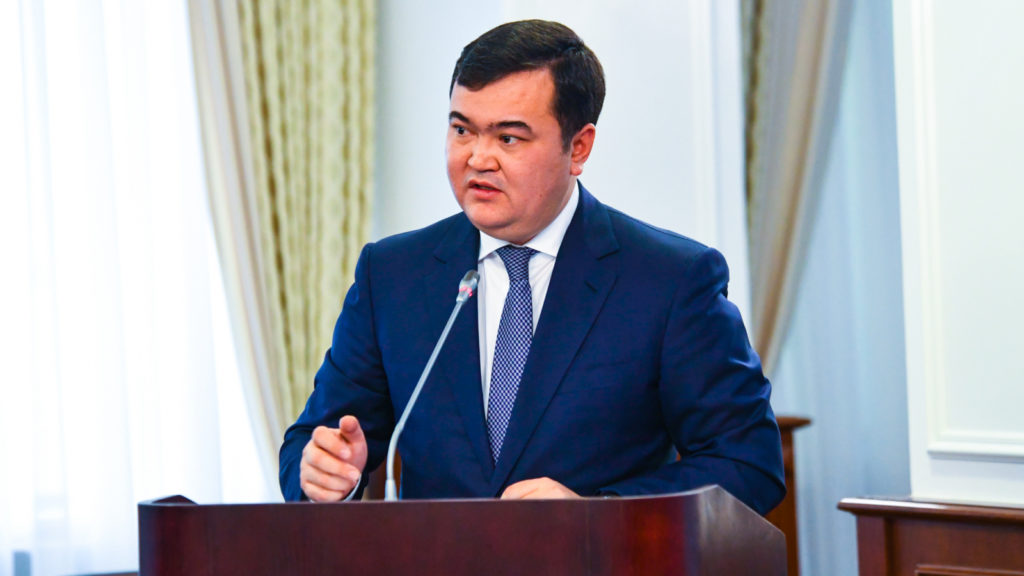ASTANA – Implementing smart heat metering devices in houses across the country, a project associated with Kazakhstan’s digitisation, will reduce citizens’ expenses, said Minister for Investment and Development Zhenis Kassymbek during a Dec. 4 government meeting in the capital.
The devices were announced in conjunction with a change in paperwork required for construction. The new anti-corrosion technologies for heating pipelines prolongs their life, while digitising documentation and video and photo monitoring speeds the construction process. Changes in both fields increase transparency and improve services.
To date, approximately 50,000 heat metering devices have been installed in 45 percent of the country’s houses. An additional 62,000 units are scheduled to be connected.
According to ministry data, installing heat-metering devices without an automatic heat supply station reduces costs for a 60-square metre, two-room apartment by 36 percent, or 2,720 tenge (US$7.34). The savings can reach 32.5 billion tenge (US$87.67 million) per year nationwide.
“For the full-scale installation of heat metering devices and automatic heat points, we are preparing the documents on attracting investments and funds from banks,” said Kassymbek.
In addition, the e-Shanyraq unified information system for housing funds and housing and public utilities has also been created in pilot mode. The system allows residents to participate in managing their houses online, monitoring the funds’ movement and its use. Residents are able to verify correct billing based on metering devices’ data and tariffs.
“We plan to connect the system to more than 2,000 technical passports of residential buildings and more than 4,000 metering devices. Full connection is expected by 2022,” he added.
Plans are underway to introduce new technologies to improve heat supply. In conjunction with Astana-Teplotranzit, German company Merus started a pilot project Nov. 30 to apply anti-corrosion technologies to a 24-kilometre steel pipe in the capital. Using similar technologies in Almaty developed by Japanese company Mitsui is also under consideration.
“Due to the anti-corrosion technologies’ implementation, it is possible to reduce the upgrading costs of 100 kilometres of heat network from 16 billion tenge (US$43.16 million) to 2.4 billion tenge (US$6.47 million) on average and extend its life cycle to 30 years,” said Kassymbek.
A complete inventory of residential buildings, connecting all natural monopolies to a unified information system, developing energy service contracts, new financing, connecting mechanisms for metering devices and common technical requirements for metering devices are planned for next year. Reducing electricity tariffs should not affect the natural monopolies’ work.
Housing and public utility energy consumption is expected to reduce by 17 percent due to the up-to-9-percent decrease in heat networks’ losses, a 52.7 billion tenge (US$142.17 million) reduction per year. The savings by primary resources can reduce CO2 emissions to 5.8 million tonnes annually.
Regarding digitising the construction industry, Kassymbek noted documents are being transferred from paper to electronic format. A united digital portal has been created and will be tested in pilot mode at construction sites in the capital. The contracting organisation and technical and designer supervision departments, the main participants in the process, have access to the specified portal and all interested governmental agencies can also connect to the system.
“The portal covers all stages of construction – from the excavation to the construction’s completion. All works will not only end with acts (finishing documents), but also be stored in photo and video formats,” he said.
Video from the site will be broadcast to ensure quality control at all stages of construction, including the commissioning procedure for the facility. Each participant will be able to electronically sign the appropriate declaration, quality statement and statement on the compliance of the work performed, after which the customer will sign the facility acceptance certificate and send it online to the state registration agency.
The video and photo equipment used during construction will be transferred to the citywide video surveillance system after its completion. The portal is expected to be commissioned in 2019.

